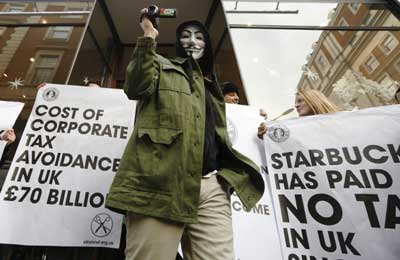
Profits up, but Britain gets less tax from big firms
London, December 27, 2012
Big companies in Britain now pay less tax than they did 12 years ago despite a big jump in profitability, a Reuters analysis of official data shows.
Tax campaigners say the trend is the clearest signal yet that tax avoidance has blossomed under a more business-friendly strategy at the UK tax authority Her Majesty's Revenue and Customs (HMRC).
Large companies' payments of corporation tax - the UK equivalent of corporate income tax - totaled 21 billion pounds ($34 billion) in 2011/12, HMRC data shows. That was down five billion pounds or 21 percent since 2000/01 when the government, then controlled by the Labour Party, took the first steps towards a more collaborative approach to big business.
At the same time, the gross operating surplus for all companies in the UK - a widely watched measure of companies' profitability compiled by the Office of National Statistics - has risen 65 percent, to 329 billion pounds. The economy has grown by 55 percent over the same period, and receipts of both personal income tax and small companies' income tax are higher.
HMRC and the finance ministry denied the figures showed an increase in tax avoidance - legal tactics used by multinationals such as Google, Amazon and Starbucks. They cited recent economic weakness and lower corporation tax rates. The UK's official corporation tax rate was steady at 30 percent between 2000 and 2007 but has been gradually cut. In the last tax year it was 26 percent.
Reuters calculations show the lower tax rate and the weak economy account for about half the fall, leaving around 2.6 billion pounds of the difference in the amount of corporate tax paid between 2000/01 and 2011/12 unaccounted for.
John Christensen of Tax Justice Network, a tax campaigning group, said the figures show successive governments' attempts to create a more business-friendly administration - which includes a policy known as "enhanced relationship" based on mutual trust - have encouraged companies to use such tactics.
"These figures tell a more powerful story than any figures I have seen so far," he said, adding that senior HMRC staff had told him in recent years that they were "alarmed" at the drop in payments from large companies. HMRC defines these as firms with annual profit of more than 1.5 million pounds.
The finance ministry declined to comment on the calculations.
"PARADOXICAL"
Prem Sikka, a professor of accounting at Essex University who has written extensively about tax avoidance, said that even allowing for the tax cut, the figures were "paradoxical".
"How are they managing to reconcile higher profits with lower taxes?" he said. "It can't be done ... unless they are booking these profits somewhere else." Companies reporting for tax purposes are increasingly diverting UK profits to lower-tax jurisdictions, he said.
Google, for example, channels $4 billion of UK sales through Ireland each year, most of which ends up in Bermuda. Google said it complies with tax law in every country in which it operates but that it also has an obligation to its shareholders "to run our business efficiently".
When shown the calculations, an HMRC spokesman said the downward trend may also have been emphasised by a shift in the way taxes were paid from 1999 which led to "elements of double counting" in 2000/01 and 2001/02. That could make revenues in those years look artificially high. He declined to quantify the impact of this.
Sikka dismissed the impact of this change.
"That wouldn't make any difference to the total tax liability," he said.
HMRC's own data does not point to a spike in corporation tax payments over the period the changes were initiated.
Total corporation tax payments were just 2 billion pounds higher in 2001-2002 than in 1998-1999, a rise of 7 percent, while GDP rose 16 percent over the period.
The government's tax minister, David Gauke, who has described corporation tax as one of "the most economically damaging taxes", called the tax authority's current approach "very successful" in a September speech. He declined requests for an interview. – Reuters







